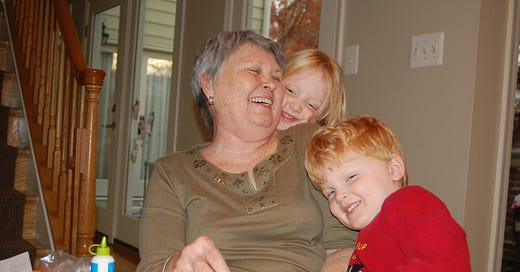Have you called your mama today?
Learning to love learning is what I'm thankful for on Mother's Day
“Have you called your mama today? I sure wish I could call mine.”
As a devotee of the University of Tennessee Volunteers, I grew up rooting against Alabama’s legendary football coach Paul “Bear” Bryant, except when he was delivering that punchline as the pitchman for South Central Bell’s TV ads.
The Bear’s intimidating scowl and gravelly voice became warm and endearing in thirty seconds. That’s why the 1970s ad still has magic today and still echoes in social media every Mother’s Day weekend. For all of us who have lost our mothers, the Bear’s admonition still rings true.
My mother had no indoor plumbing as a youngster and used an outhouse with pages of the prior year’s Sears, Roebuck & Co. catalog as the implements of hygiene. The oldest child of two factory workers, she attended a two-room schoolhouse. Her family’s fortunes got a little better in the 1950s, as the country’s did. After two semesters at one Baptist college and a heavy summer school load at another, she was told she had to come home; there was not enough money for two tuition bills and the boy in the family, her brother, was due to get his turn.
Coming home from college meant punching the clock in the local Burlington Hosiery mill, a job that reinforced her belief in education. She got married and hauled a house trailer around the country with my dad, who spliced cable as part of AT&T’s effort to wire the nation for long distance telephoning. She eventually returned to school and finished her undergraduate degree at age 34, juggling two kids and a classroom teaching job by then. As we got older she went back again and completed a Master’s degree – a big deal for a woman whose parents who never made it past the eighth grade.
Education was more than a job for my mom – it was an all-encompassing approach. She believed in the Western canon, starting with classic nursery rhymes and fables. She familiarized my sister and me with the important writers of American fiction and bought us the children’s books that won the Newberry Award and Caldecott Medal each year. She played Johann Sebastian Bach on the organ and made us take piano lessons long past the time we were interested. We had to know and appreciate the great composers of classical music, she said, because it was part of “cultural literacy.”
She went out of her way to bring history to life with museums and detours on our summer car trips. We saw Natchez, Williamsburg, Reynolda House, The Henry Ford Museum, Santa Fe, countless gardens, plantations, monuments, and the site of the Andersonville Prison. I did not understand at the time why she insisted we tromp through what remains of the gnat-infested, inhumane hell hole for Civil War POWs, but now I know. It’s the same reason she insisted we see the National Civil Rights Museum in Memphis when she came to visit me in college. Man’s inhumanity to man is something that must be grasped graphically, even if the teaching is no fun.
She had great penmanship and lamented that mine was not. She made a practice of sending hand-written notes and urged me to do the same. At home or in front of others, she corrected our grammar – which I later learned was doing us a huge favor.
Mom dabbled in every kind of art herself and dragged us along: ceramics, macrame, quilting, sketching; you name it, she tried it and we saw her do it. She was always formally learning something new, up to the master gardener’s certification program she completed with the Agricultural Extension Agency while battling cancer.
Her high level of attachment to us was subordinated to send us off to competitive colleges far away. Her alma mater, the University of Tennessee, would’ve been a fine place for us to matriculate. It was affordable and just 45 minutes from home, but having found adulthood themselves hauling that trailer around, mom and dad knew their birds needed to fly away from the nest.
Mom was known as an exceptional teacher of reading in our little Appalachian town, and I came to appreciate just how talented she was when I watched her work with our daughter and toddler son. When she died at age 68, leaving her four grandkids too soon was her only regret. They had so much more to learn from her. My daughter, now 17, has her grandmother’s musical genes and she’s a bookworm, with a penchant for classic literature. That cannot be coincidental.
Education research will tell you that a child’s best chance to go far in school is to be reared in a home with both of his or her birth parents. The second most important predictor is to be the child of a mother who had high educational attainment herself.
I don’t have statistics to back it up, but I’m willing to say that having a mother who holds the process of learning in high regard, and never stops learning herself, is even more important.
Happy Mother’s Day. Have you called your mama? I sure wish I could call mine.





What a wonderful article! 💕